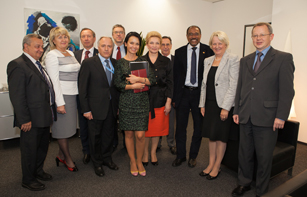
Feature Story
Ukraine to lead the AIDS response in Eastern Europe
13 September 2012
13 September 2012 13 September 2012
Vice-Prime-Minister and Minister of Health of Ukraine, Raisa Bogatyrova and UNAIDS Executive Director Michel Sidibé. UNAIDS Headquarters, Geneva. 12 September 2012.
Credit: UNAIDS
A senior delegation from Ukraine led by the Vice-Prime-Minister and Minister of Health, Raisa Bogatyrova met with UNAIDS Executive Director Michel Sidibé at the UNAIDS Headquarters in Geneva on 12 September 2012. During the meeting, they discussed the existing challenges and opportunities for an effective HIV response in the country.
With an HIV prevalence among people who inject drugs of 21.5 %, Ukraine is experiencing the most severe HIV epidemic in Eastern Europe. Mr Sidibé commended Ukraine’s efforts to address the situation and highlighted the positive outcomes resulting from the availability of harm reduction services, including needle-exchange and opioid substitution therapy for people who inject drugs.
“I am very impressed by the impact achieved by harm reduction programmes in Ukraine,” said Mr Sidibé. “This is clear evidence that a combination of leadership, good policies and resources, can halt even the most severe HIV epidemic,” he added. Mr Sidibé also welcomed the Government’s commitment to provide adequate financing for the sustainability of such prevention programmes. Currently, harm reduction programmes are externally funded and implemented by civil society organizations.
Ukraine can only overcome this epidemic in partnership with international organizations and civil society
Vice-Prime-Minister and Minister of Health of Ukraine, Raisa Bogatyrova
“Ukraine can only overcome this epidemic in partnership with international organizations and civil society,” said Ms Bogatyrova. The national AIDS response in Ukraine—one of the most comprehensive in Eastern Europe according to UNAIDS—is characterized by a strong inclusion and collaboration between national and international partners.
The Vice-Prime-Minister also highlighted the link between HIV and national security. “HIV has a disproportionate impact on young people. From the point of view of the national security – HIV is Ukraine’s top priority.”
The Government of Ukraine has increased the domestic investments for HIV by 10-fold in the last five years. During the meeting, ideas were exchanged on how to enhance the impact of HIV investments, scale-up HIV treatment, which currently only covers 25% of the people eligible and how to make procurement of HIV drugs more efficient.

Members of the Ukrainian delegation visiting UNAIDS. UNAIDS Headquarters, Geneva. 12 September 2012.
Credit: UNAIDS
Mr Sidibé expressed the hope that Ukraine as a large, middle-income country in the heart of Europe could serve as a model to other countries in the region for the delivery of HIV prevention, treatment, care and support services.
The preparations for the upcoming visit to Ukraine of a delegation of the UNAIDS Programme Coordinating Board (PCB) on 4-5 October 2012 were also discussed. The first visit of the PCB to Ukraine will be led by the UNAIDS Deputy Executive Director, Management and Governance, Jan Beagle. The aim of the visit will be to learn about the country’s National AIDS Programme, which is currently being revised, as well as to experience first-hand the progress made in the AIDS response.

